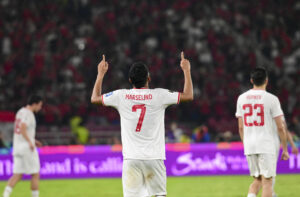Riyad Mahrez and Achraf Hakimi are two athletes at the top of their games, highly coveted by top European clubs. Both men share an interesting story that’s becoming common in the world of professional football.
They are the faces of a new generation of African international players. Born in Europe to African parents, they are the first wave of a phenomenal new trend changing the African game and raising new questions about international loyalties.
In this article, we will take a look at what’s happening, why it’s happening, and why current circumstances could lead to a further rise of the European African footballer.
The Rise of the European African Footballer
Dual-Nationality Stars on the Rise
Immigration has always been a massive part of international football; some of the greatest players in their countries’ histories are the children of immigrants, or immigrants themselves.
Names such as Zinedine Zidane, Paul Pogba and N’golo Kante for France, Alphonso Davies for Canada and Deco for Portugal come to mind.
In 2019, Qatar won the Asian Cup for the first time in history, with the team made up almost entirely of immigrants or the children of immigrants.
One year earlier, France won the 2018 World Cup in Russia with a team that had 19 players that were either immigrants or the children of immigrants. That was out of 23 players, an incredible 83 per cent of the French team.
So what’s so unique about players like Mahrez, Hakimi and Wilfried Zaha? What makes them unique is that these players are not representing the countries that their families immigrated to, but rather, the countries their families immigrated from.
With a lot of African countries suffering throughout the 20th and early 21st centuries with corruption, war and other unique issues and circumstances, the amount of Africans immigrating to Europe has only risen; France is the largest recipient of African immigrants.
The large African diaspora in Europe has led to a huge amount of ethnic African players representing their European countries in the international game. Africans have since played a massive role in both of France’s World Cup victories in particular.
Why is This Happening?
The reality is, there are only so many players who can represent their European national teams.
Countries with huge immigrant populations like France, England and Germany are all amongst the world’s best, and competition for spots is hard.
Players developed in Europe, often having represented European nations at the youth level, have a much higher chance of earning themselves a spot on an African team, than on a European team.
And for those players and also for their African countries this was a win-win.
Countries like Morocco, Algeria, Nigeria and the Ivory Coast can boost their ranks with players that were developed and trained in Europe. These are players who have been through a better development system than anything they can offer.
The large African diaspora in Europe offers them the ability to recruit without having to go through the process of developing and growing young talent. This is something African FA’s have historically been terrible at.
And this isn’t just a theory. Despite European national teams being associated more with the successful utilisation of immigrants, during the 2018 World Cup it was African teams that had the highest percentage of foreign-born talent on their squads – a whopping 29 per cent.
Algeria and the Rise of the European African Footballer
Arguably the best African national team right now, Algeria were crowned the kings of Africa in 2019 when they impressively won their second African Cup title in Cairo; they defeated the Sadio Mane led Senegal 1-0.
However, the Algerian squad that took the African continent by storm, led by the electric Riyad Mahrez, was dominated by foreign, mainly French-born players.
In the last two years alone, Algeria has called up 22 foreign-born players to represent the Fennec Foxes, all of them French-born. To go back even further, to 2010 when Algeria qualified for the World Cup in South Africa, Algeria called up over fifty foreign players, with all but one having been born in France.
Algeria’s poaching system seems to have worked for them in terms of establishing themselves on the African stage – they won the African cup. But Algeria’s aims to become a global superpower had them targeting bigger fish – mainly the likes of Houssem Aouar and Kylian Mbappe, both obviously ending in failure.
In fact, Algeria’s attempt to poach players from France is well documented; perhaps the most well-known case of an “almost” poach is Nabil Fekir. The midfielder had actually decided to represent Algeria, despite being born in France. However, the French FA, recognising that he could be a valuable asset stepped in. After a call with French coach Didier Deschamps, Fekir changed his mind.
But Algeria are much better now than they were then; they have a team that can play against the best in the world. Should Algeria continue to rise, would France be able to continue holding them at bay when another Fekir situation comes?
European African Footballer: Issues of Race
There is another reason why many high profile players make the switch to Africa. And it’s the most obvious reason there is – race.
One of the biggest complaints that minorities have while playing for European national teams is the difference they see in treatment when things aren’t going too well.
Romelu Lukaku has previously said: “When things were going well, I was reading newspaper articles and they were calling me Romelu Lukaku, the Belgian striker. When things weren’t going well, they were calling me Romelu Lukaku, the Belgian striker of Congolese descent.”
Lukaku is not the only player who has shared these sentiments, as minorities from all walks of life have complained about the discrimination they’ve felt while playing international football.
This includes Mario Balotelli of Italy and Mesut Ozil of Germany, with the latter leaving the German national team in 2018, saying: “I am German when we win, but I’m an immigrant when we lose.”
No doubt the current generation of immigrant footballers in Europe have seen all of this, and perhaps it’s even led some to pause when it came time to selecting a national team.
Let’s take for example players like Nabil Touaizi. The 19-year-old was born in Spain to Moroccan parents. Yet, surprisingly, at the age of 18, he turned down the opportunity to represent Spain to wear the Atlas Lions kit instead. And he’s not alone.
Achraf Hakimi, one of the most talented young players in the world, shocked Spain when he made the exact same decision. Despite representing Spain at every level of the youth system, he made the switch to his parents’ country saying “I simply felt that it would be better to play with Morocco, I do not know what was waiting for me in the future…I felt that I was Moroccan, that I was Muslim because of my family and all my roots that I have there.”
Morocco Succeeds Where Algeria Fails
As a matter of fact, where Algeria have failed to poach, Morocco have succeeded, convincing several young European talents to switch their allegiance to Morocco, including Chelsea star Hakim Ziyech.
Morocco has been successful enough to garner the attention of Europe, with former Dutch manager Ronald Koeman going so far as accusing Morocco of bribing young Dutch-Moroccans, saying that “If large sums are offered by Moroccan officials, it is difficult to convince them (the dual nationals) to stay. I think we have to do much more to convince them, but I also understand how ten or more players would choose to defend the colours of their home countries, whether it is Morocco or Turkey, at the expense of the Dutch team.”
Koeman’s claims upset Hakim Ziyech, himself a Dutch-Moroccan. He responded by saying that “People invent the craziest things, I have not received any money to play with the Moroccan national team.”
All these factors combined, from a younger generation less tolerant of racism to hungry players eager for the opportunity to get more guaranteed playing time while also reconnecting with their heritage, could lead to European teams losing more players to African teams.
The 29 per cent figure is only likely to rise; countries such as Nigeria, Ivory Coast and Egypt are recruiting more players from Europe.
The massive diaspora available for these teams allows them to build stronger squads of players, developed in Europe, trained in Europe, disciplined in Europe.
It’s the model that’s changing the African game; should a few more high profile players decide to follow the likes of Hakimi and Ziyech, it could have massive implications on the European and world game as well, as the rise of the European African footballer continues.
Main Photo






